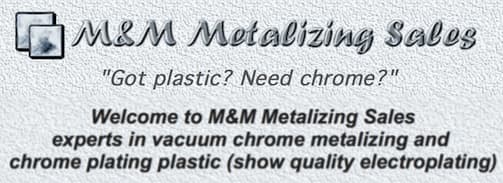
-----
Blistering in chrome plated plastic parts
I am an automotive buyer responsible for chrome grilles. I have had endless issues with getting the parts chromed for a whole host of reasons. The tool is now in really good shape and we are seeing the best mouldings ever seen off it. We have changed the material to a natural Novadur material (as suggested by our chromer) and are now experiencing small patches of blistering on the parts after chroming. Can anyone give me any advice on what may be causing the blistering?
Sarah TaylorBuyer - Coventry, UK
2007
2007
Sarah,
This isn't really my field, but two things come to mind:
1. The release agent from the moulding tool may be contaminating the surface and the process used by the plater is not robust enough to remove it.
2. The platers cleaning/activation of the base is not aggressive enough.
In either case it is probably best to sit down with your platers and see if you can come up with a solution.
Aerospace - Yeovil, Somerset, UK
Sarah.
Blistering appear for many reasons one of them is when the ABS is not completed dried and had moisture splay. When the speed of moulding is too high and appear stress on the surface.
-When the etch is not enough you need increase the temperature of the bath or the concentration of sulfuric acid or chromic acid.
I hope this can help you.
- Guadalajara, Mexico
2007
Further to Gabriel's comment, if you can strip off the plating and examine the plastic, if it's due to moisture in the plastic, the blister can be seen in the moulding. If you can test the molding prior to plating by dipping in glacial acetic acid ⇦ on eBay or Amazon [affil link] for 30 secs and examining, high stress will show as white markings which if the problem is in this area then the problem is in the molding

Geoffrey Whitelaw
- Port Melbourne, Australia
2007
Sarah
If the parts are not splayed. (Moisture in the plastic), and are not stressed. Then, you need to find a plater who is able to plate platable grade plastics.
It may be your problem in molding, you should check with acetic acid and make sure molding conditions are proper.
But, if it is not stress and not splay, find a new plater before you spend too much time and money.
Regards
Rob Coffie
Warren, Michigan, USA
2007
please check the plastic quality and stripp of plating .
try acid test the plastic.
check concentration of etch bath.is it correct
check electroless nickel bath
check trivalent cr
check nickel thickness.
ex chemist - Birmingham, UK
February 12, 2008
finishing.com is made possible by ...

Q, A, or Comment on THIS thread -or- Start a NEW Thread